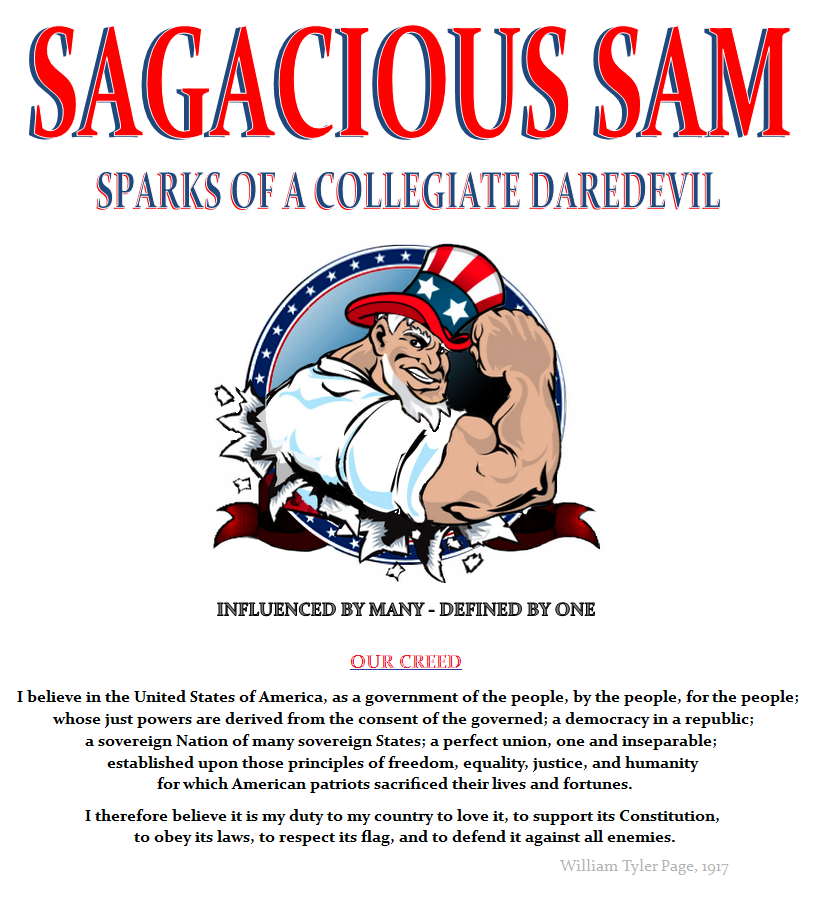There once was a time in America when drafting contests were held to judge who wrote beyond compare about America. During one such competition in 1917, a man named William Tyler Page won the contest with “The American Creed.” A creed is a system, a doctrine, an oath, an article of faith, as well as a summarization of one’s overarching ideological beliefs. Individuals who stand by the American Creed base their identity on its core values; more importantly, our creed codifies individuals within our country as members of a nation of people who identify themselves—despite trivial differences and minutiae—as Americans; something greater than themselves. If you live in the United States of America, and identify yourself as an American, it will be impossible to avoid shivers and goose bumps while reading the American Creed; those uncontrollable sensations that remind you of your morality and mortality. Breathe it in my Brothers and Sisters, and take heart:
“I believe in the United States of America, as a government of the people, by the people, for the people; whose just powers are derived from the consent of the governed; a democracy in a republic; a sovereign Nation of many sovereign States; a perfect union, one and inseparable; established upon those principles of freedom, equality, justice, and humanity for which American patriots sacrificed their lives and fortunes.
I therefore believe it is my duty to my country to love it, to support its Constitution, to obey its laws, to respect its flag, and to defend it against all enemies.”
Did you feel that? I hope so.
In merely one hundred words – a feat in itself – Page powerfully summarized both the American political tradition and the responsibilities of every citizen to his or her government. The American Creed uses passages and phrases from America’s Declaration of Independence, the Preamble to the Constitution, Lincoln's Gettysburg Address, and Daniel Webster’s reply to Robert Y. Hayne in the Senate in 1830. When Page was asked about what he had written, he said that “It is the summary of the fundamental principles of the American political faith as set forth in its greatest documents, its worthiest traditions, and its greatest leaders.”
Being an American has a different meaning for every person. What does it mean, to me, to be an American? Well, by being naturally born in America, you are an American. That’s a label though, not an explanation of what it means to be an American. It means so much more than being born here, and I think that people have lost that understanding, due to America’s prosperity in the twentieth-century. In being an American, you and every American are, above-all-else, free; master of your own destiny within limits of the law; nothing can be forced upon you. There is value in American freedom; every American is valuable; no man is naturally above the rest. We are “one nation, under God, indivisible, with liberty and justice for all.”
The American Creed is something we can believe in, something we should believe in; even more so now than ever before. The platform of “change we can believe in” appears now more like ancient hieroglyphs for which the key’s been lost. It was at a time understood, decipherable within the context of the situation. However, the American Creed is a lasting oath which gives the citizens of this great nation a perspective. Without its perspective, we’re forced to live in the moment with no ties to the past. Our nation’s momentum has lost its touch with the perspective granted by its foundations. How can I, you, we, or America, move forward without a perspective; sans the American Creed? America does not need change, it requires stability; the strength envisioned in our creed.
The Sophist, Gorgias, founder of classic rhetorical theory said that “If everyone, on every subject, had memory of the past and knowledge of the present and foresight of the future, speech would not do what it does; but as things are, it is easy neither to remember the past nor to consider the present nor to predict the future; so that on most subjects most people take opinion as counselor to the soul;” if there is a more relevant insight in history, I’m yet to find it. The foundations of rhetoric have not lost their efficacy in over two millennia; should the foundations of America lose theirs, in less than three centuries? Was the beating heart of our nation – and the creed for which it stands – drowned-out by the charismatic, rhetorical phrases of the future president? It’s possible, but persuasion is only persuasive when an audience is willing to accept it. Americans are losing their willingness, and now is the time to remember; believe in what America has—and will—stand for in the future.
What has happened to us, in contrast with previous patriotic generations: our grandparents and great Americans their senior? Why don’t Americans believe in the future of America today? Where’s our creed? Where’s our leader; our Captain America? Why are we standing idly by while the once experimental form of government known as Democracy, which was predicted to fail, is in front of our eyes being slowly subjugated by the catastrophic politics of yesterday? What originated our tolerance for failure; a word which I am hesitant to use because it isn’t in my vocabulary, and at a time it wasn’t in America’s either.








No comments:
Post a Comment